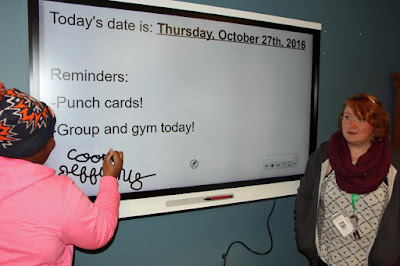On October 6th, Seven Hills Pediatric Center in Groton MA moved 83 medically-fragile children
and young adults out of the building in 19 minutes.
“It was our first-ever full evacuation drill and it went extremely well,” according to Executive Director Holly Jarek, DSc VP/NHA.
The exercise was provoked by the impact a tornado had on a Midwest nursing home. It ripped the roof off in the middle of the night, pulling out the wiring and setting off sprinklers, forcing rapid removal of residents, she said.
“Our residents are non-ambulatory and have multiple disabilities. We wanted to know that we could quickly bring them to safety if we needed to, and it was a real morale booster to confirm that we could.”
Nursing home evacuation plans are regularly reviewed with local and state emergency officials. Seven Hills Pediatric Center had conducted untimed drills in the past, but until now, the full contingent of residents had been moved only into the hallways during practices to avoid major disruption in their schooling and medical treatments.
“We have a wonderful relationship with local fire and police and met multiple times in recent months to devise this plan together,” said Ms. Jarek, the director.
Ultimately 120 staffers, volunteers, police and firefighters executed the fullscale evacuation. Teachers, aides, therapists, medical and administrative staff and volunteers were quickly engaged in pushing wheelchairs, holding doors open, moving bulky medication carts outside with vital medications, and even packing up computers so caregivers could access medical records outside the building.
In the case of a major disaster, the protocol would be to pull the fire engines out of local stations to provide a big warm bay as a staging area and shelter for the residents, explained Ms.Jarek.
“What you don’t want to do is tie up hospital beds if other options are available,” she said.
Groton Fire Chief Steele McCurdy was impressed with the efficiency and speed of the evacuation, and appreciated the opportunity to learn more about how the staff interacts with the residents.
“We were primarily observers, but some of our personnel learned how to use the (bed) lift systems. The drill also made us realize how critical it will be to bring in lots of resources in a short time.”
“A major event would require massive manpower,” the chief added. “Inclement weather would impact our ability to transport also, so we now plan to activate our statewide mobilization plan early on to quickly bring mutual aid teams of ambulances, fire trucks and personnel from other parts of the region.”
The next drill will be conducted during harsher weather conditions or perhaps at night or on a weekend, to identify more obstacles and challenges to evacuation.
“We have a great structure, and we will continue to improve on it,” said Chief McCurdy.
Both Seven Hills and New England Pediatric Care in Billerica MA and other members of the national Pediatric Complex Care Association recently participated in a national conference in
Richmond, VA on evacuation strategies specific to pediatric facilities. The New York City Pediatric Disaster Coalition at Maimonides Medical Center is coordinating the project.
For more information about the project contact leaders Emily Raisch and John Jermyn through the website:
http://www.programinfosite.com/peds/
To learn more about disaster planning for long-term skilled care facilities in Massachusetts, visit:
http://www.mutualaidplan.org/Info/Default.aspx?OrgID=108.









